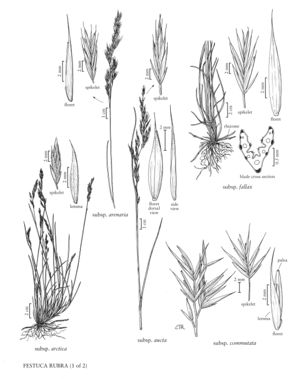Difference between revisions of "Festuca rubra subsp. commutata"
FNA>Volume Importer |
FNA>Volume Importer |
||
| Line 19: | Line 19: | ||
-->{{Treatment/Body | -->{{Treatment/Body | ||
| − | |discussion=<p | + | |discussion=<p>Festuca rubra subsp. commutata is extensively used for lawns and road verges. It is native to Europe, growing from southern Sweden southward, but is widely introduced elsewhere in the world. In the Flora region, it is common south of Alaska, Yukon Territory, and the Northwest Territories.</p> |
|tables= | |tables= | ||
|references= | |references= | ||
| Line 35: | Line 35: | ||
|basionyms= | |basionyms= | ||
|family=Poaceae | |family=Poaceae | ||
| + | |illustrator=Cindy Roché | ||
|reference=None | |reference=None | ||
|publication title= | |publication title= | ||
|publication year= | |publication year= | ||
|special status= | |special status= | ||
| − | |source xml=https:// | + | |source xml=https://bibilujan@bitbucket.org/aafc-mbb/fna-data-curation.git/src/314eb390f968962f596ae85f506b4b3db8683b1b/coarse_grained_fna_xml/V24/V24_586.xml |
|subfamily=Poaceae subfam. Pooideae | |subfamily=Poaceae subfam. Pooideae | ||
|tribe=Poaceae tribe Poeae | |tribe=Poaceae tribe Poeae | ||
Revision as of 16:08, 30 October 2019
Plants without rhizomes, usually densely cespitose. Culms 25-90 cm. Sheaths red-brown, scarious near the base, puberulent or pubescent, slowly shredding into fibers; blades 0.3-0.7(1) in diameter, conduplicate, sometimes glaucous, abaxial surfaces scabrous or smooth; abaxial sclerenchyma in narrow to broad strands; adaxial sclerenchyma rarely present. Inflorescences 4-13(30) cm, more or less contracted, often secund; branches spreading at anthesis, scabrous on the angles. Spikelets 7-11 mm, with 3-9 florets. Glumes ovate-lanceolate, acute; lower glumes 2.5-4 mm; upper glumes 3.5-5 mm; lemmas 4.5-6 mm, green or reddish violet distally, glabrous, smooth, awned, awns 1-3.3 mm; anthers 1.8-2.2(3) mm. 2n = 28, 42.
Discussion
Festuca rubra subsp. commutata is extensively used for lawns and road verges. It is native to Europe, growing from southern Sweden southward, but is widely introduced elsewhere in the world. In the Flora region, it is common south of Alaska, Yukon Territory, and the Northwest Territories.
Selected References
None.
